Law of Business Organisation: Shareholder Rights Analysis Report
VerifiedAdded on 2022/09/30
|5
|1142
|286
Report
AI Summary
This report provides a detailed legal analysis of shareholder rights within the context of XYZ Ltd, a company with both ordinary and cumulative preference shares. The report examines several key issues: whether the issuance of additional preference shares constitutes a variation of class rights, the entitlement of preference shareholders to a 5% dividend, the possibility of claiming dividends for prior years, and the participation of preference shareholders in dividend payments alongside ordinary shareholders. The analysis is grounded in relevant sections of the Corporations Act 2001, including sections 246B, 246C, 1.5.9, 254T, 254U, and 254W, as well as case law such as Bank of NSW v Commonwealth, Burland v Earle, and Beck v Weinstock. The conclusion addresses each issue, providing a comprehensive understanding of the legal framework governing shareholder rights in this scenario, emphasizing the discretion of the company directors in dividend decisions and the specific entitlements of preference shareholders.
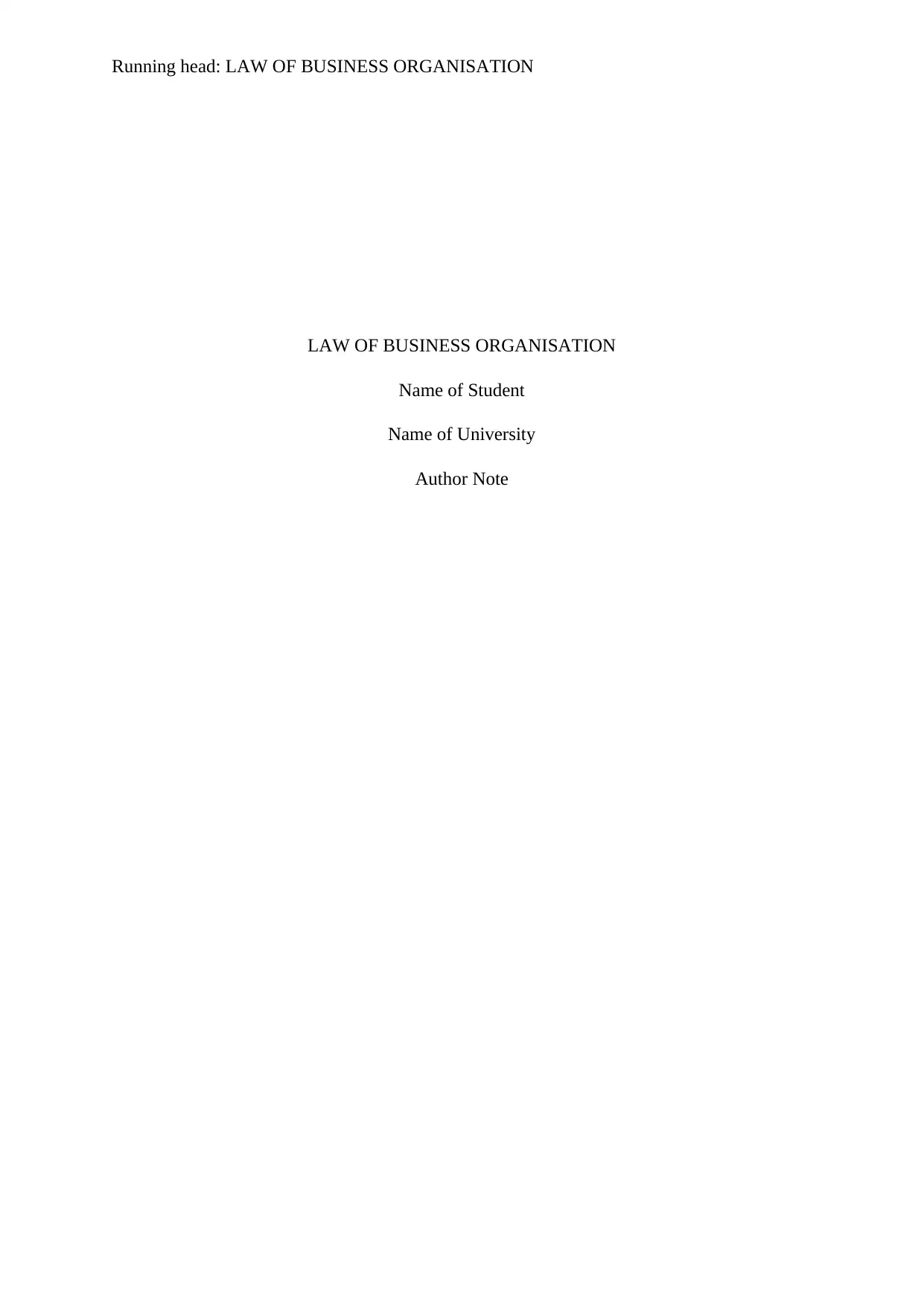
Running head: LAW OF BUSINESS ORGANISATION
LAW OF BUSINESS ORGANISATION
Name of Student
Name of University
Author Note
LAW OF BUSINESS ORGANISATION
Name of Student
Name of University
Author Note
Paraphrase This Document
Need a fresh take? Get an instant paraphrase of this document with our AI Paraphraser
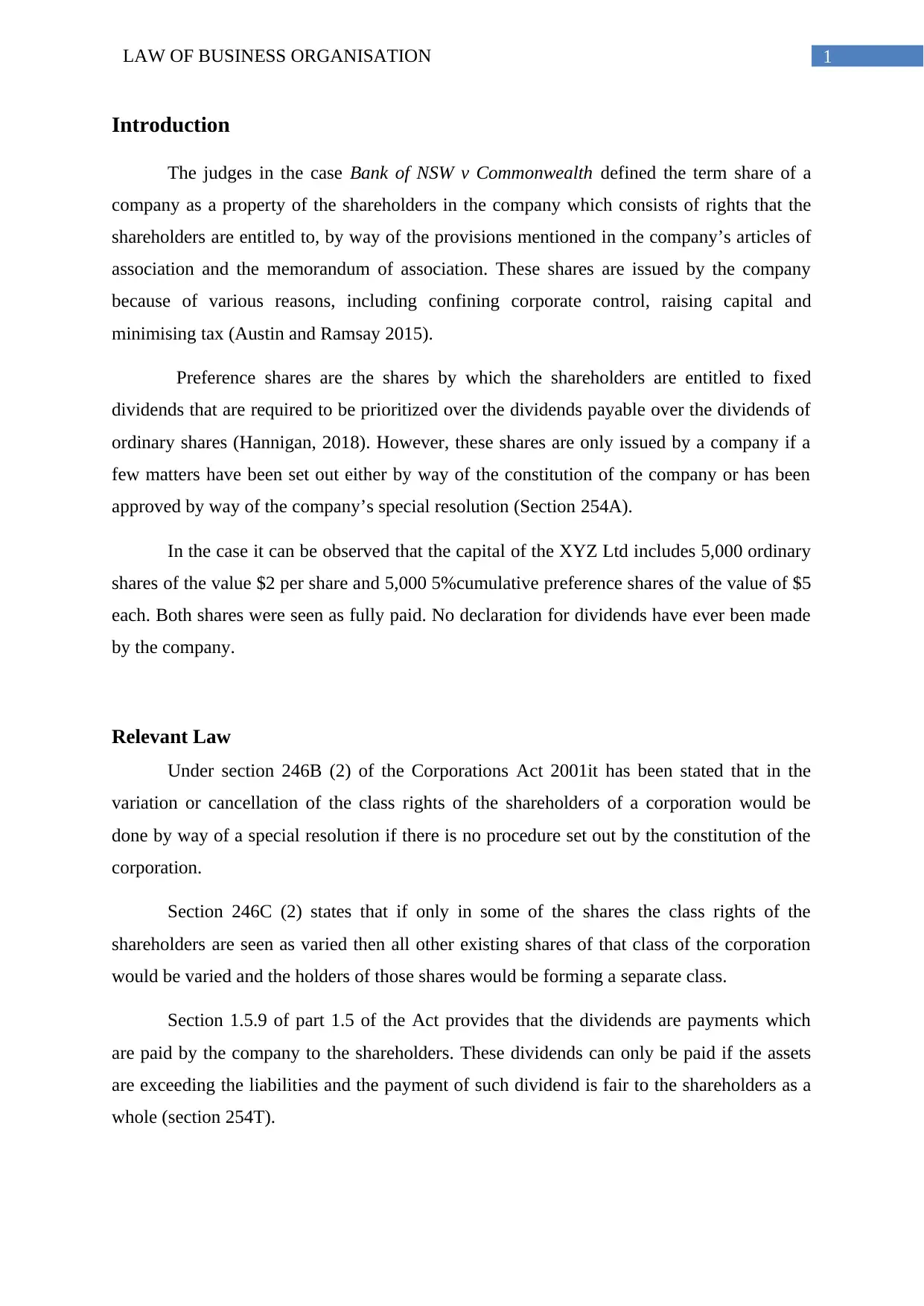
1LAW OF BUSINESS ORGANISATION
Introduction
The judges in the case Bank of NSW v Commonwealth defined the term share of a
company as a property of the shareholders in the company which consists of rights that the
shareholders are entitled to, by way of the provisions mentioned in the company’s articles of
association and the memorandum of association. These shares are issued by the company
because of various reasons, including confining corporate control, raising capital and
minimising tax (Austin and Ramsay 2015).
Preference shares are the shares by which the shareholders are entitled to fixed
dividends that are required to be prioritized over the dividends payable over the dividends of
ordinary shares (Hannigan, 2018). However, these shares are only issued by a company if a
few matters have been set out either by way of the constitution of the company or has been
approved by way of the company’s special resolution (Section 254A).
In the case it can be observed that the capital of the XYZ Ltd includes 5,000 ordinary
shares of the value $2 per share and 5,000 5%cumulative preference shares of the value of $5
each. Both shares were seen as fully paid. No declaration for dividends have ever been made
by the company.
Relevant Law
Under section 246B (2) of the Corporations Act 2001it has been stated that in the
variation or cancellation of the class rights of the shareholders of a corporation would be
done by way of a special resolution if there is no procedure set out by the constitution of the
corporation.
Section 246C (2) states that if only in some of the shares the class rights of the
shareholders are seen as varied then all other existing shares of that class of the corporation
would be varied and the holders of those shares would be forming a separate class.
Section 1.5.9 of part 1.5 of the Act provides that the dividends are payments which
are paid by the company to the shareholders. These dividends can only be paid if the assets
are exceeding the liabilities and the payment of such dividend is fair to the shareholders as a
whole (section 254T).
Introduction
The judges in the case Bank of NSW v Commonwealth defined the term share of a
company as a property of the shareholders in the company which consists of rights that the
shareholders are entitled to, by way of the provisions mentioned in the company’s articles of
association and the memorandum of association. These shares are issued by the company
because of various reasons, including confining corporate control, raising capital and
minimising tax (Austin and Ramsay 2015).
Preference shares are the shares by which the shareholders are entitled to fixed
dividends that are required to be prioritized over the dividends payable over the dividends of
ordinary shares (Hannigan, 2018). However, these shares are only issued by a company if a
few matters have been set out either by way of the constitution of the company or has been
approved by way of the company’s special resolution (Section 254A).
In the case it can be observed that the capital of the XYZ Ltd includes 5,000 ordinary
shares of the value $2 per share and 5,000 5%cumulative preference shares of the value of $5
each. Both shares were seen as fully paid. No declaration for dividends have ever been made
by the company.
Relevant Law
Under section 246B (2) of the Corporations Act 2001it has been stated that in the
variation or cancellation of the class rights of the shareholders of a corporation would be
done by way of a special resolution if there is no procedure set out by the constitution of the
corporation.
Section 246C (2) states that if only in some of the shares the class rights of the
shareholders are seen as varied then all other existing shares of that class of the corporation
would be varied and the holders of those shares would be forming a separate class.
Section 1.5.9 of part 1.5 of the Act provides that the dividends are payments which
are paid by the company to the shareholders. These dividends can only be paid if the assets
are exceeding the liabilities and the payment of such dividend is fair to the shareholders as a
whole (section 254T).
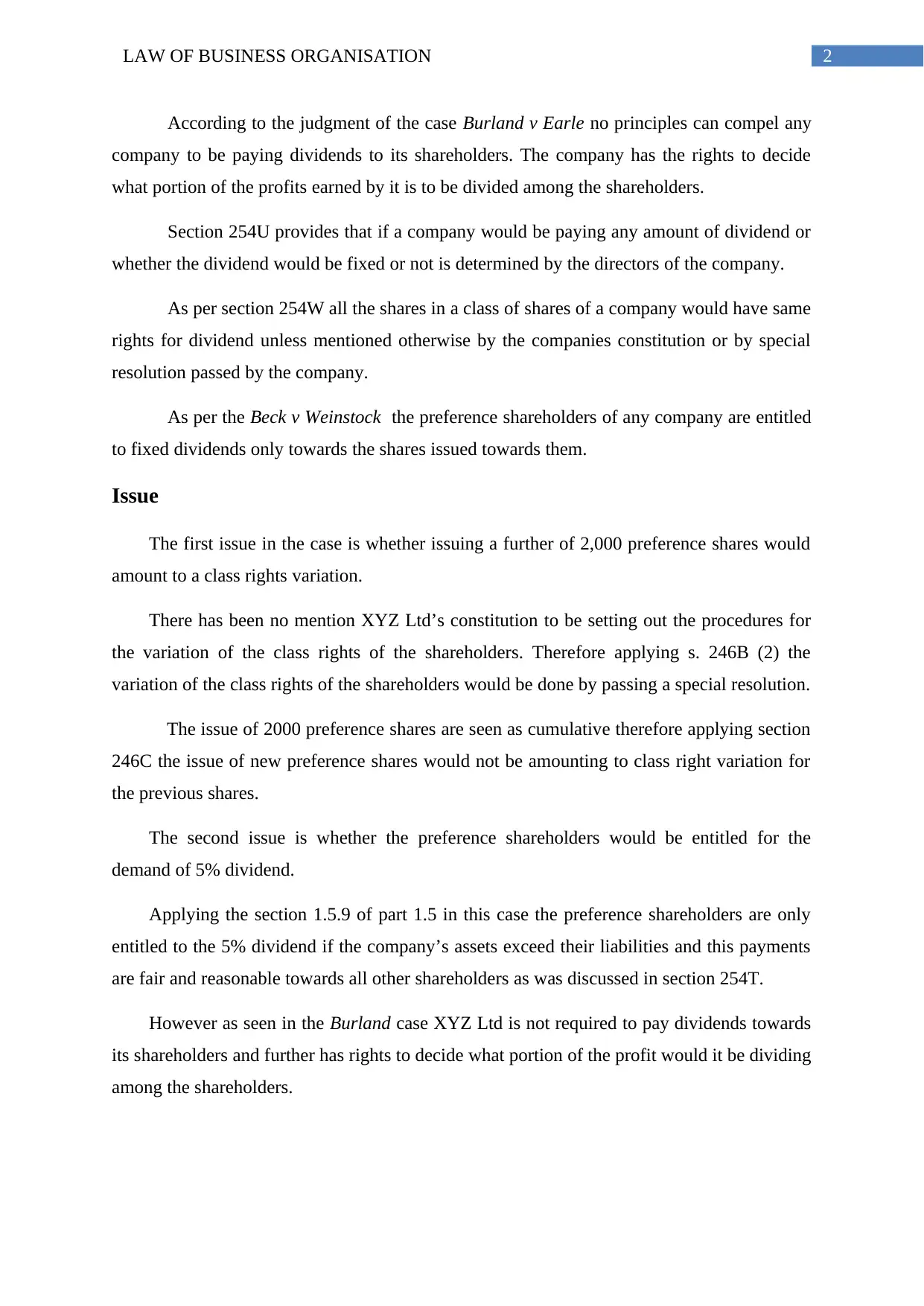
2LAW OF BUSINESS ORGANISATION
According to the judgment of the case Burland v Earle no principles can compel any
company to be paying dividends to its shareholders. The company has the rights to decide
what portion of the profits earned by it is to be divided among the shareholders.
Section 254U provides that if a company would be paying any amount of dividend or
whether the dividend would be fixed or not is determined by the directors of the company.
As per section 254W all the shares in a class of shares of a company would have same
rights for dividend unless mentioned otherwise by the companies constitution or by special
resolution passed by the company.
As per the Beck v Weinstock the preference shareholders of any company are entitled
to fixed dividends only towards the shares issued towards them.
Issue
The first issue in the case is whether issuing a further of 2,000 preference shares would
amount to a class rights variation.
There has been no mention XYZ Ltd’s constitution to be setting out the procedures for
the variation of the class rights of the shareholders. Therefore applying s. 246B (2) the
variation of the class rights of the shareholders would be done by passing a special resolution.
The issue of 2000 preference shares are seen as cumulative therefore applying section
246C the issue of new preference shares would not be amounting to class right variation for
the previous shares.
The second issue is whether the preference shareholders would be entitled for the
demand of 5% dividend.
Applying the section 1.5.9 of part 1.5 in this case the preference shareholders are only
entitled to the 5% dividend if the company’s assets exceed their liabilities and this payments
are fair and reasonable towards all other shareholders as was discussed in section 254T.
However as seen in the Burland case XYZ Ltd is not required to pay dividends towards
its shareholders and further has rights to decide what portion of the profit would it be dividing
among the shareholders.
According to the judgment of the case Burland v Earle no principles can compel any
company to be paying dividends to its shareholders. The company has the rights to decide
what portion of the profits earned by it is to be divided among the shareholders.
Section 254U provides that if a company would be paying any amount of dividend or
whether the dividend would be fixed or not is determined by the directors of the company.
As per section 254W all the shares in a class of shares of a company would have same
rights for dividend unless mentioned otherwise by the companies constitution or by special
resolution passed by the company.
As per the Beck v Weinstock the preference shareholders of any company are entitled
to fixed dividends only towards the shares issued towards them.
Issue
The first issue in the case is whether issuing a further of 2,000 preference shares would
amount to a class rights variation.
There has been no mention XYZ Ltd’s constitution to be setting out the procedures for
the variation of the class rights of the shareholders. Therefore applying s. 246B (2) the
variation of the class rights of the shareholders would be done by passing a special resolution.
The issue of 2000 preference shares are seen as cumulative therefore applying section
246C the issue of new preference shares would not be amounting to class right variation for
the previous shares.
The second issue is whether the preference shareholders would be entitled for the
demand of 5% dividend.
Applying the section 1.5.9 of part 1.5 in this case the preference shareholders are only
entitled to the 5% dividend if the company’s assets exceed their liabilities and this payments
are fair and reasonable towards all other shareholders as was discussed in section 254T.
However as seen in the Burland case XYZ Ltd is not required to pay dividends towards
its shareholders and further has rights to decide what portion of the profit would it be dividing
among the shareholders.
⊘ This is a preview!⊘
Do you want full access?
Subscribe today to unlock all pages.

Trusted by 1+ million students worldwide
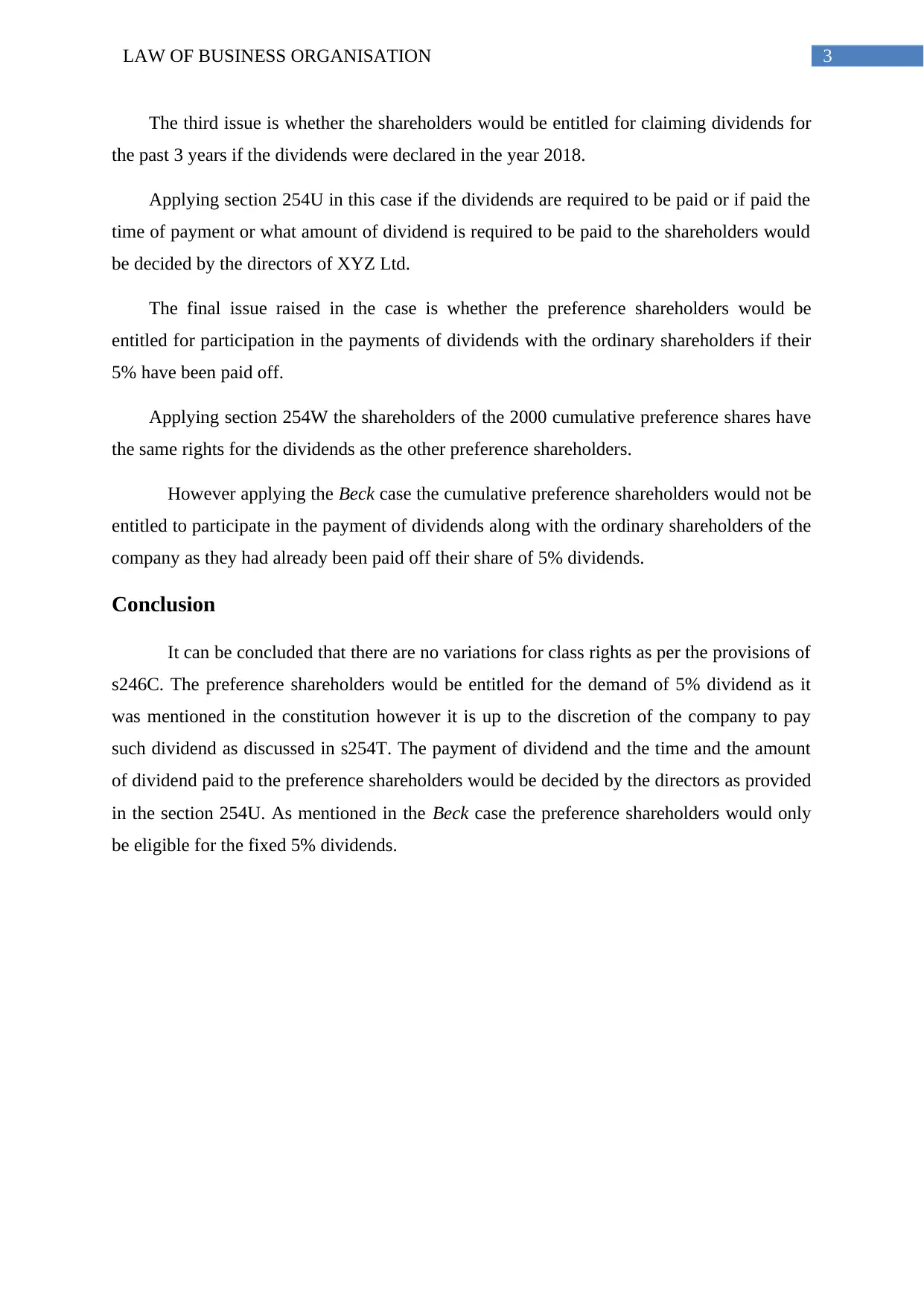
3LAW OF BUSINESS ORGANISATION
The third issue is whether the shareholders would be entitled for claiming dividends for
the past 3 years if the dividends were declared in the year 2018.
Applying section 254U in this case if the dividends are required to be paid or if paid the
time of payment or what amount of dividend is required to be paid to the shareholders would
be decided by the directors of XYZ Ltd.
The final issue raised in the case is whether the preference shareholders would be
entitled for participation in the payments of dividends with the ordinary shareholders if their
5% have been paid off.
Applying section 254W the shareholders of the 2000 cumulative preference shares have
the same rights for the dividends as the other preference shareholders.
However applying the Beck case the cumulative preference shareholders would not be
entitled to participate in the payment of dividends along with the ordinary shareholders of the
company as they had already been paid off their share of 5% dividends.
Conclusion
It can be concluded that there are no variations for class rights as per the provisions of
s246C. The preference shareholders would be entitled for the demand of 5% dividend as it
was mentioned in the constitution however it is up to the discretion of the company to pay
such dividend as discussed in s254T. The payment of dividend and the time and the amount
of dividend paid to the preference shareholders would be decided by the directors as provided
in the section 254U. As mentioned in the Beck case the preference shareholders would only
be eligible for the fixed 5% dividends.
The third issue is whether the shareholders would be entitled for claiming dividends for
the past 3 years if the dividends were declared in the year 2018.
Applying section 254U in this case if the dividends are required to be paid or if paid the
time of payment or what amount of dividend is required to be paid to the shareholders would
be decided by the directors of XYZ Ltd.
The final issue raised in the case is whether the preference shareholders would be
entitled for participation in the payments of dividends with the ordinary shareholders if their
5% have been paid off.
Applying section 254W the shareholders of the 2000 cumulative preference shares have
the same rights for the dividends as the other preference shareholders.
However applying the Beck case the cumulative preference shareholders would not be
entitled to participate in the payment of dividends along with the ordinary shareholders of the
company as they had already been paid off their share of 5% dividends.
Conclusion
It can be concluded that there are no variations for class rights as per the provisions of
s246C. The preference shareholders would be entitled for the demand of 5% dividend as it
was mentioned in the constitution however it is up to the discretion of the company to pay
such dividend as discussed in s254T. The payment of dividend and the time and the amount
of dividend paid to the preference shareholders would be decided by the directors as provided
in the section 254U. As mentioned in the Beck case the preference shareholders would only
be eligible for the fixed 5% dividends.
Paraphrase This Document
Need a fresh take? Get an instant paraphrase of this document with our AI Paraphraser
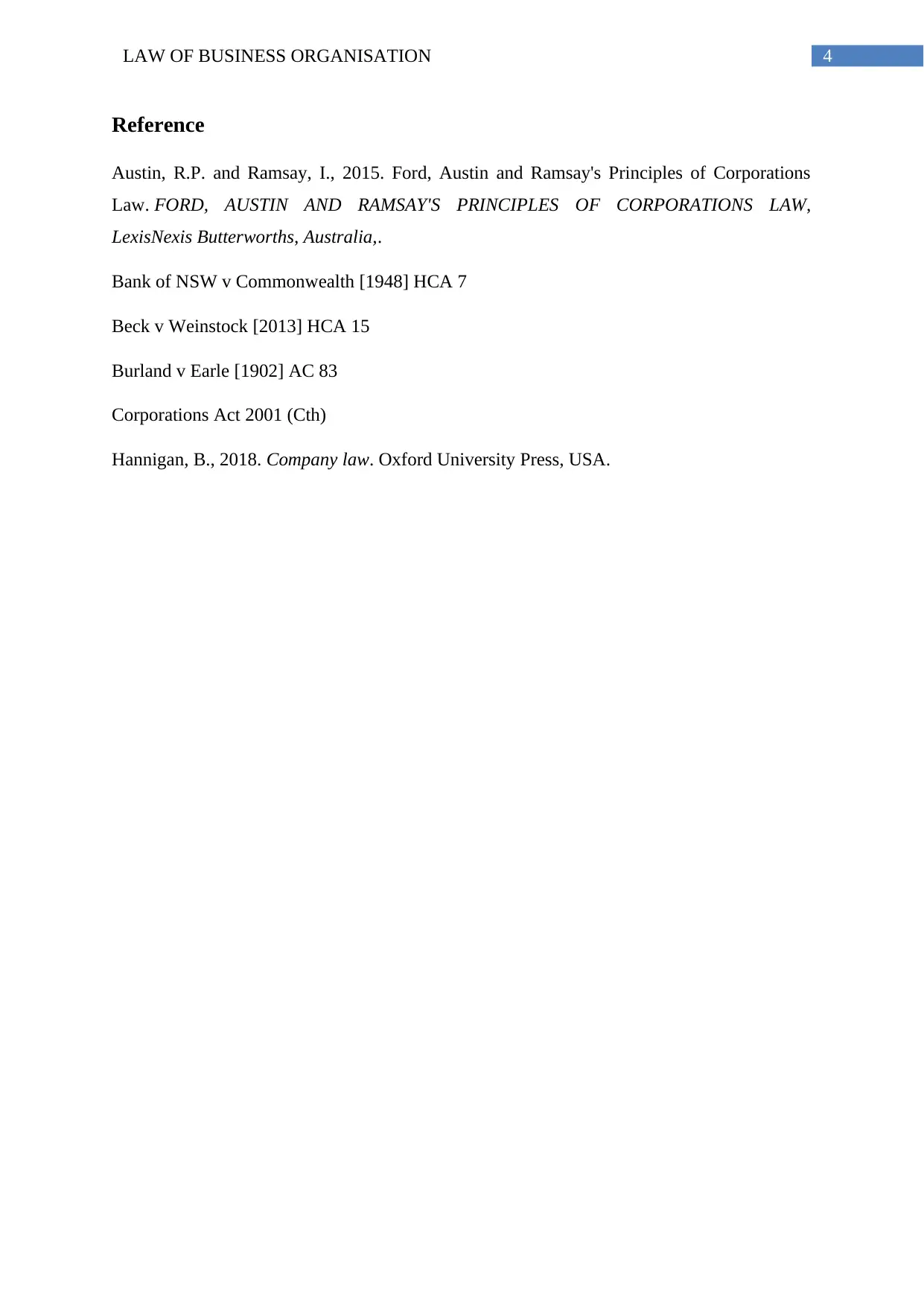
4LAW OF BUSINESS ORGANISATION
Reference
Austin, R.P. and Ramsay, I., 2015. Ford, Austin and Ramsay's Principles of Corporations
Law. FORD, AUSTIN AND RAMSAY'S PRINCIPLES OF CORPORATIONS LAW,
LexisNexis Butterworths, Australia,.
Bank of NSW v Commonwealth [1948] HCA 7
Beck v Weinstock [2013] HCA 15
Burland v Earle [1902] AC 83
Corporations Act 2001 (Cth)
Hannigan, B., 2018. Company law. Oxford University Press, USA.
Reference
Austin, R.P. and Ramsay, I., 2015. Ford, Austin and Ramsay's Principles of Corporations
Law. FORD, AUSTIN AND RAMSAY'S PRINCIPLES OF CORPORATIONS LAW,
LexisNexis Butterworths, Australia,.
Bank of NSW v Commonwealth [1948] HCA 7
Beck v Weinstock [2013] HCA 15
Burland v Earle [1902] AC 83
Corporations Act 2001 (Cth)
Hannigan, B., 2018. Company law. Oxford University Press, USA.
1 out of 5
Related Documents
Your All-in-One AI-Powered Toolkit for Academic Success.
+13062052269
info@desklib.com
Available 24*7 on WhatsApp / Email
![[object Object]](/_next/static/media/star-bottom.7253800d.svg)
Unlock your academic potential
Copyright © 2020–2026 A2Z Services. All Rights Reserved. Developed and managed by ZUCOL.





